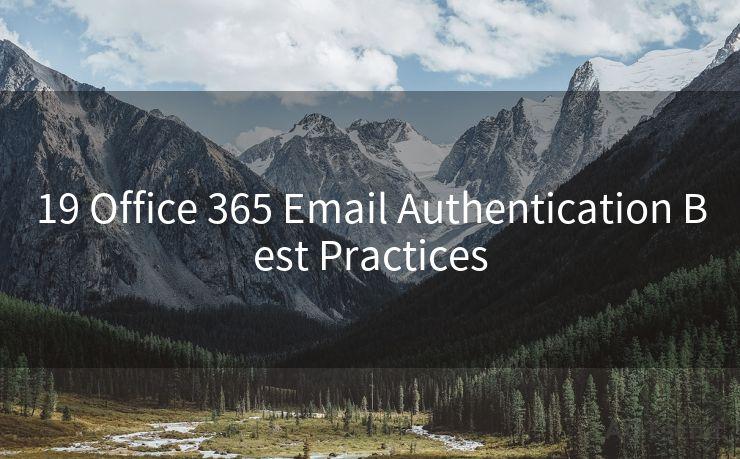19 Office 365 Email Authentication Best Practices




In the modern business environment, email communication is crucial, and with Office 365 being a popular choice for enterprises, ensuring email authentication is key to maintaining secure communications. Here are 19 best practices for Office 365 email authentication that will help bolster your organization's security posture.
1. Enable Multi-Factor Authentication (MFA)
Implementing MFA adds an extra layer of security to your Office 365 accounts. Requiring users to provide additional verification, such as a code from a mobile app or a fingerprint, significantly reduces the risk of unauthorized access.
2. Utilize Strong Passwords
Enforce a strong password policy that includes a mix of uppercase, lowercase, numbers, and special characters. Regularly prompt users to change their passwords to maintain security.
3. Configure SPF Records
Setting up Sender Policy Framework (SPF) records helps validate outgoing email, ensuring that messages sent from your domain are legitimate and not spoofed.
4. Implement DKIM Signing
DomainKeys Identified Mail (DKIM) signing adds a digital signature to outgoing emails, verifying their authenticity and integrity. This helps recipients identify forged or altered messages.
🔔🔔🔔
【AOTsend Email API】:AOTsend is a Managed Email Service for sending transactional emails. Support Email Types: reminders, authentication, confirmations, notifications, verification codes, invoices, password resets, account activations, billing statements, two-factor authentication (2FA), and one-time passwords (OTP) emails, etc. $0.28 per 1000 Emails. 99% Delivery, 98% Inbox Rate.
You might be interested in:
Why did we start the AOTsend project, Brand Story?
What is a Managed Email API, How it Works?
Best 25+ Email Marketing Platforms (Authority,Keywords&Traffic Comparison)
Best 24+ Email Marketing Service (Price, Pros&Cons Comparison)
Email APIs vs SMTP: How they Works, Any Difference?
5. Enable DMARC Policy
Domain-based Message Authentication, Reporting, and Conformance (DMARC) policy allows domain owners to specify how receivers should handle unauthenticated emails, further reducing the chances of spoofing.
6. Regularly Audit Mailbox Permissions
Periodically review and update mailbox permissions to ensure that only authorized users have access to sensitive information.
7. Utilize Office 365 Advanced Threat Protection
Office 365 Advanced Threat Protection offers additional security features like safe links and safe attachments, protecting users from malicious content.
8. Train Employees on Security Best Practices
Regularly educate employees on email security, phishing scams, and the importance of following authentication procedures.
9. Monitor Suspicious Activity
Use Office 365's built-in reporting tools to monitor suspicious email activity and take prompt action when necessary.
10. Implement Email Encryption
Encrypt sensitive emails to ensure that only the intended recipient can read the content, even if the email is intercepted.
11. Restrict External Sharing
Limit the ability to share emails and documents with external parties to reduce the risk of data leakage.
12. Use Dedicated Admin Accounts
Create dedicated administrator accounts for managing Office 365 settings to reduce the risk of unauthorized changes.
13. Enable Audit Logging
Turn on audit logging to track user activities and identify any suspicious behavior.
14. Update Software Regularly
Keep Office 365 and all related software up to date to benefit from the latest security patches and updates.
15. Implement Email Archiving
Archive old emails to reduce clutter and improve security by removing potential targets for attackers.
16. Use Secure Protocols
Ensure that all email communications use secure protocols like TLS to protect data in transit.
17. Conduct Regular Security Reviews
Periodically review your Office 365 security settings to identify and address any potential vulnerabilities.
18. Prepare for Disaster Recovery
Have a disaster recovery plan in place to quickly restore email services in case of an outage or attack.
19. Leverage AI and Machine Learning
Utilize Office 365's advanced security features that use AI and machine learning to detect and prevent threats proactively.

By following these 19 best practices for Office 365 email authentication, your organization can significantly enhance its email security posture. Remember, email remains a primary target for cyberattacks, making it crucial to stay vigilant and proactive in protecting this critical communication channel.




Scan the QR code to access on your mobile device.
Copyright notice: This article is published by AotSend. Reproduction requires attribution.
Article Link:https://www.mailwot.com/p1987.html



